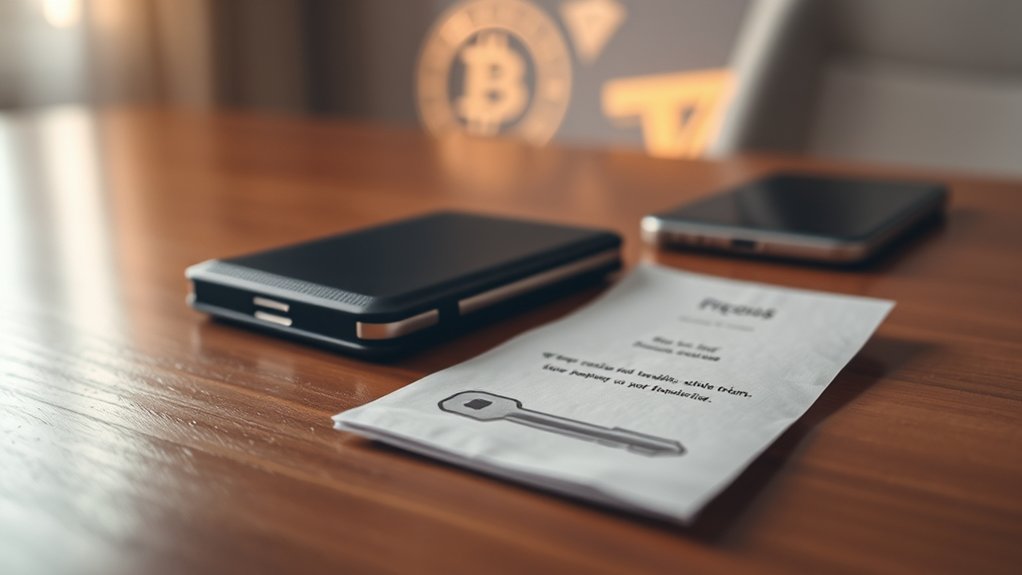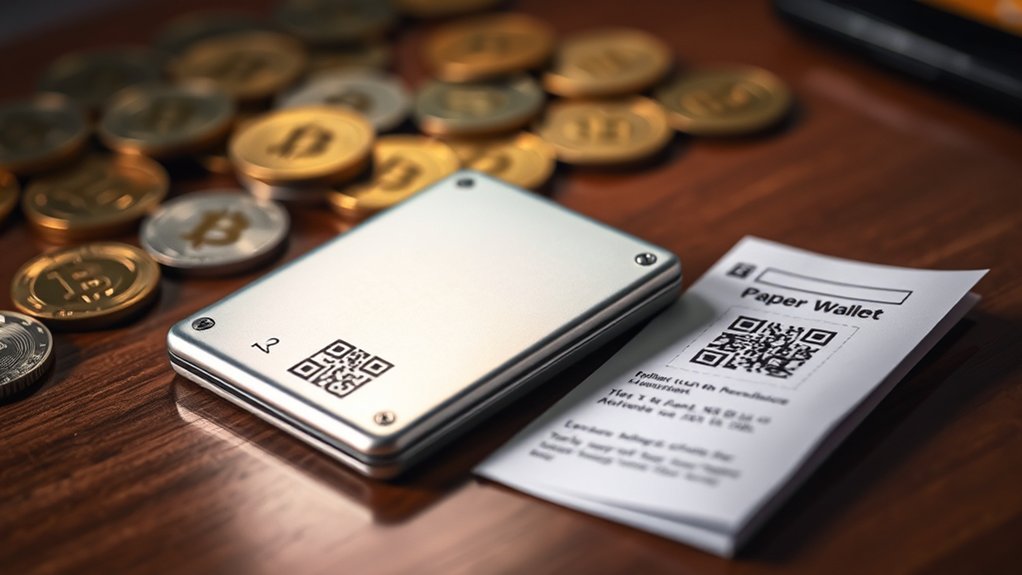Cold wallets are the ultimate bouncers of the crypto world. They keep your private keys offline, making it nearly impossible for hackers to crash the party. Think of hardware wallets like USB sticks, or go old school with paper wallets. Sure, they add layers of security and control, but accessing your funds can feel like solving a Rubik’s Cube blindfolded. They can be pricey too. Curious about the nitty-gritty of keeping your crypto safe? There’s more to uncover.

In the world of cryptocurrency, not all storage solutions are created equal. Enter cold wallets, the unsung heroes of crypto security. These wallets keep your private keys offline, far away from the clutches of hackers and phishing scams. It’s like putting your digital money in a safe instead of leaving it on the kitchen counter for anyone to grab.
Cold wallets are primarily for long-term storage—perfect if you’re planning to hold onto your crypto like it’s a rare baseball card. A secure method for storing cryptocurrencies offline offers peace of mind against unauthorized access. Additionally, cold wallets provide a separation from smart contracts, which prevents unwanted approvals and enhances security, making them an ideal choice for protecting your assets from on-chain and off-chain threats. This method of storage emphasizes the importance of maintaining control over private keys, ensuring that users have full ownership of their assets.
There are a couple of main types: hardware wallets and paper wallets. Hardware wallets look like USB sticks and are all about that robust security vibe. They store private keys offline, making them a fortress against online threats. On the other hand, paper wallets are, well, literally just printed keys on paper. Basic, yes, but they do the job if you’re not looking for anything fancy.
The beauty of cold wallets lies in their security features. They protect private keys from online attacks, and access controls like PINs and biometric authentication keep snoopers out. Transactions are signed offline, which means your keys stay out of the digital spotlight. This self-custody approach gives users control over their funds, reducing risks associated with exchange hacks. Sounds great, right?
But let’s not sugarcoat it—cold wallets come with their downsides. Accessing your funds isn’t as easy-breezy as tapping an app. It can be a hassle. Plus, if you lose your hardware wallet or your paper gets soaked in coffee, good luck getting your crypto back.
Setting them up can also be a headache for the less tech-savvy, and yes, some of these wallets don’t come cheap.
In short, cold wallets are a solid choice for those serious about crypto storage, offering unmatched security for long-term holders. Just remember, with great power comes great responsibility.
Frequently Asked Questions
Can I Use Cold Wallets for All Cryptocurrencies?
Cold wallets are not a one-size-fits-all solution.
Sure, many support a bunch of cryptocurrencies, but definitely not all. Some are picky, favoring Bitcoin or a select few others.
And let’s be real—if you’re banking on the latest altcoin, you might be out of luck. They can also be a hassle for frequent trading.
How Do I Set up a Cold Wallet?
Setting up a cold wallet? It’s not rocket science, but it does require some steps.
First, grab your hardware wallet from a legit source—no sketchy eBay deals. Unbox it, check for tampering, and download the official software.
Follow the setup prompts, create a PIN and a seed phrase—don’t lose that!
Finally, keep it offline. Seriously, less is more here. Your crypto deserves better than being exposed online.
Are Cold Wallets Completely Hack-Proof?
Cold wallets aren’t exactly Fort Knox.
Sure, they’re safer than online options, but “hack-proof”? Not quite. They can still fall victim to physical theft, firmware attacks, or just plain bad luck.
If someone nabs your hardware wallet, they might access your keys.
And don’t forget about supply chain issues—those devices could be tampered with before they even reach you.
What Happens if I Lose My Cold Wallet?
Losing a cold wallet? Ouch. That’s like losing a suitcase full of cash. If there’s no backup, say goodbye to your cryptocurrency.
Sure, those private keys were safe from hackers, but they’re not immune to your forgetfulness. You might want to report the loss, but honestly, it’s like looking for a needle in a haystack.
Just remember, securing that seed phrase next time could save you from this disaster.
Can I Transfer Funds Back to an Exchange From a Cold Wallet?
Yes, funds can be transferred back to an exchange from a cold wallet.
It’s not rocket science, but it does require a few steps. First, connect the cold wallet to your computer.
Then, fire up the wallet software and grab the exchange’s deposit address. Create the transaction, sign it, and voilà!
Just make sure you double-check everything. Mistakes can be costly. Seriously, who wants to lose their hard-earned crypto over a typo?





